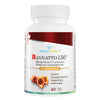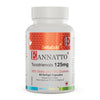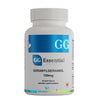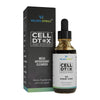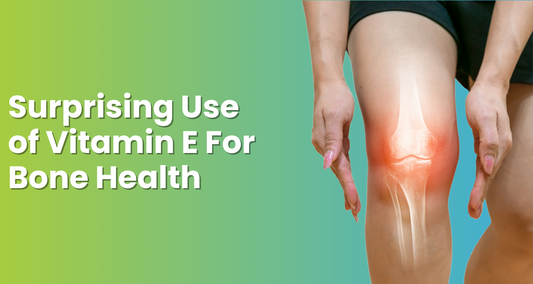Did you know that vitamin B12 is vital for maintaining overall health and energy levels?
Vitamin B12, also known as cobalamin, is a water-soluble vitamin that plays a crucial role in various bodily functions, including red blood cell production, nerve function, and DNA synthesis. While it is primarily known for its benefits in energy production, the advantages of vitamin B12 extend beyond just combating fatigue.
In this blog, we will explore what is vitamin b12 good for. We will delve into its role in energy production, brain function, and the common symptoms of vitamin B12 deficiency. Additionally, we will discuss dietary sources, supplementation, and the potential benefits of vitamin B12 injections. By the end, you will understand what is vitamin B12 good for and why vitamin B12 is an essential nutrient for your well-being.
Key Takeaways:
- What is vitamin B12 good for? Vitamin B12 is important for overall health and energy levels.
- It plays a crucial role in energy production within the body, combating fatigue and promoting vitality.
- Vitamin B12 is essential for maintaining optimal brain function, including memory, cognition, and mood regulation.
- Common symptoms of vitamin B12 deficiency include fatigue, weakness, and neurological issues.
- Good food sources of vitamin B12 include meat, fish, dairy products, and fortified cereals.
The Role of Vitamin B12 in Energy Production
Vitamin B12, also known as cobalamin, is a crucial nutrient that plays a significant role in energy production within the body. It is essential for the proper functioning of the nervous system and the production of red blood cells, both of which are important for maintaining energy levels and combating fatigue.
One of the key ways in which vitamin B12 contributes to energy production is through its involvement in the metabolism of carbohydrates, fats, and proteins. It helps convert these macronutrients into usable energy that the body can utilize for various processes, including physical activity and cognitive function.
In addition to its role in energy metabolism, vitamin B12 also supports the synthesis of DNA and RNA, which are essential for the growth and repair of cells. This includes the cells in the brain, muscles, and other tissues involved in energy production.
Vitamin B12 deficiency can lead to low energy levels, weakness, and fatigue. Inadequate intake of this vitamin, especially in individuals following a vegetarian or vegan diet, can increase the risk of deficiency. Furthermore, certain medical conditions, such as gastrointestinal disorders or malabsorption issues, may also impair vitamin B12 absorption and contribute to deficiency.
To ensure optimal energy levels and overall well-being, it is important to include dietary sources of vitamin B12 in your daily routine. Some excellent food sources of vitamin B12 include animal products like meat, poultry, fish, eggs, and dairy products.
For individuals who may have dietary restrictions or difficulty maintaining adequate intake through food alone, vitamin B12 supplements can be a convenient and effective option.
Vitamin B12 benefits for energy:
- Enhances energy metabolism
- Helps combat fatigue and tiredness
- Supports the production of red blood cells
- Aids in the growth and repair of cells involved in energy production
By ensuring you have sufficient vitamin B12 levels, you can optimize your energy levels, improve your overall health, and promote a sense of vitality and well-being.
Vitamin B12's Impact on Brain Function
Vitamin B12 plays a crucial role in maintaining optimal brain function. Its benefits extend beyond physical health and energy levels, making it essential for cognitive function, memory, and mood regulation.
Memory and Cognitive Function
The importance of vitamin B12 in memory and cognitive function cannot be overstated. It is involved in the production of neurotransmitters, which are crucial for communication between brain cells. Vitamin B12 also aids in the synthesis of DNA, RNA, and myelin, a protective covering for nerve cells.
- Research has shown that vitamin B12 deficiency can lead to cognitive impairment and memory loss.
- Moreover, adequate levels of vitamin B12 have been associated with improved memory and cognitive performance in individuals of all ages.
Mood Regulation
Vitamin B12 also plays a vital role in mood regulation due to its involvement in the synthesis of neurotransmitters such as serotonin and dopamine. These neurotransmitters are responsible for regulating emotions and feelings of well-being.
- Low levels of vitamin B12 have been linked to an increased risk of depression, anxiety, and other mood disorders.
- Supplementing with vitamin B12 has shown promising results in improving mood and reducing symptoms of depression.
In conclusion, vitamin B12 is not only essential for physical health and energy levels but also for maintaining optimal brain function. Its benefits for memory, cognition, and mood regulation underscore the importance of ensuring adequate vitamin B12 intake. Through supplementation and a balanced diet, individuals can support their brain health and overall well-being.
Vitamin B12 Deficiency Symptoms and Sources
Inadequate intake of vitamin B12 can lead to deficiency, causing various symptoms and health issues. It's crucial to understand the signs of deficiency and ensure sufficient dietary sources to maintain optimal health.
Common Symptoms of Vitamin B12 Deficiency
- Fatigue and weakness: Feeling tired and low on energy is a common symptom of B12 deficiency.
- Pale or yellowish skin: A lack of B12 can affect the production of red blood cells, leading to pale or yellowish skin tone.
- Shortness of breath: Inadequate B12 levels can impair oxygen transport, causing breathlessness.
- Tingling or numbness: Nerve damage due to B12 deficiency may cause tingling or numbness in the hands and feet.
- Memory problems: B12 plays a vital role in brain function, and its deficiency can affect memory and cognitive abilities.
Dietary Sources of Vitamin B12
Ensuring adequate intake of vitamin B12 can be achieved through various dietary sources. Some of the best sources include:
- Eggs: A single large egg contains approximately 0.6 micrograms of vitamin B12.
- Milk and dairy products: Cow's milk, cheese, and yogurt are good sources of B12, providing around 1-1.5 micrograms per serving.
- Seafood: Fish such as trout, salmon, and tuna are rich in vitamin B12.
- Meat and poultry: Beef, chicken, and lamb are excellent sources of B12, especially organ meats like liver.
- Fortified foods: Many cereals, plant-based milk alternatives, and nutritional yeast are fortified with vitamin B12.
Supplementation may be necessary for individuals at risk of deficiency, such as vegetarians, vegans, and older adults who may have decreased absorption or reduced dietary intake.
In some cases, vitamin B12 injections may be recommended, especially for those with severe deficiency or malabsorption issues.
Conclusion
What is vitamin b12 good for? Vitamin B12 offers a multitude of benefits for overall health, energy, and brain function. As an essential nutrient, it plays a crucial role in maintaining optimal well-being.
One of the key benefits of vitamin B12 is its ability to enhance energy levels. By aiding in energy production within the body, vitamin B12 can combat fatigue and promote vitality, allowing individuals to perform at their best.
Vitamin B12 also has a significant impact on brain function. It supports memory, cognition, and mood regulation, making it essential for maintaining optimal mental performance.
To obtain vitamin B12, supplementation is often necessary. Vitamin B12 supplements come in various forms, including oral supplements and injections. These forms allow individuals to ensure they are getting an adequate amount of vitamin B12 to support their health and well-being.
In conclusion, what is vitamin b12 good for, the benefits of vitamin B12 cannot be overstated. From supporting overall health and energy levels to promoting brain function, vitamin B12 is a vital nutrient that plays a key role in our well-being. Whether through supplements or injections, incorporating vitamin B12 into our daily routine can have a profound impact on our overall health and vitality.
FAQs
What is vitamin B12 good for?
Vitamin B12 is essential for various bodily functions. It plays a crucial role in maintaining a healthy nervous system, producing DNA, and forming red blood cells. It also supports proper brain function and helps to boost energy levels.
What are the vitamin B12 benefits for health?
Vitamin B12 uses offers several health benefits. It aids in the prevention of anemia, supports bone health, enhances cardiovascular health, and improves the immune system. Additionally, it is essential for maintaining healthy skin, hair, and nails.
What are the vitamin B12 benefits for energy?
Vitamin B12 is vital for energy production in the body. It helps convert food into energy and is involved in the metabolism of fatty acids and proteins. Adequate levels of vitamin B12 can help combat fatigue and increase overall energy levels.
What are the vitamin B12 benefits for brain function?
Vitamin B12 plays a significant role in maintaining optimal brain function. It supports memory, cognition, and concentration. It also helps regulate mood and can contribute to overall mental well-being.
What are the symptoms of vitamin B12 deficiency, and where can I find vitamin B12?
Common symptoms of vitamin B12 deficiency include fatigue, weakness, shortness of breath, tingling or numbness in the hands and feet, difficulty walking, poor memory, and mood changes. Vitamin B12 is naturally found in animal-based foods such as meat, fish, eggs, and dairy products. It can also be obtained through fortified foods and supplements.
Should I consider vitamin B12 supplements or injections?
If you suspect a vitamin B12 deficiency or have certain conditions that hinder proper absorption of the nutrient, supplementation may be beneficial. Vitamin B12 supplements are available in various forms, including capsules, tablets, and sublingual (under-the-tongue) preparations. In some cases, vitamin B12 injections may be recommended for individuals with severe deficiencies or malabsorption issues.
